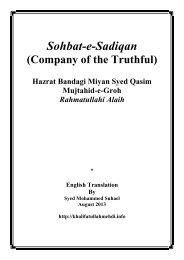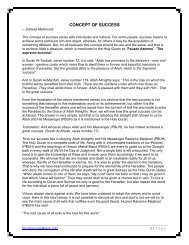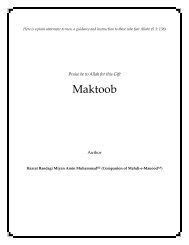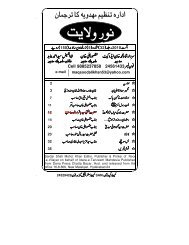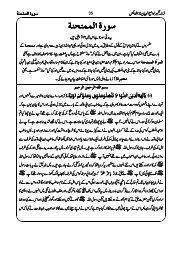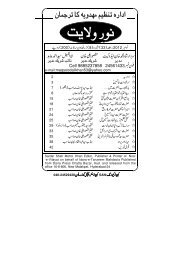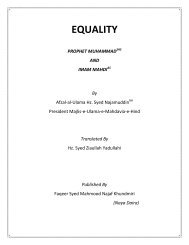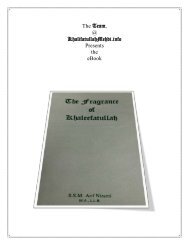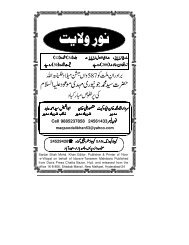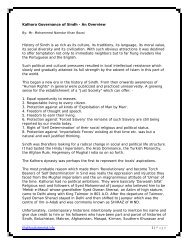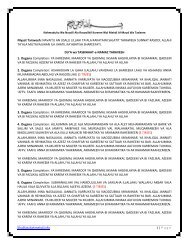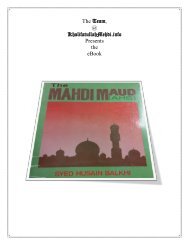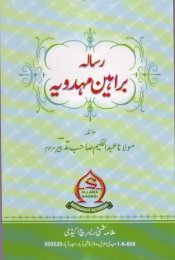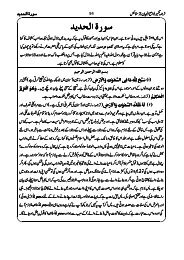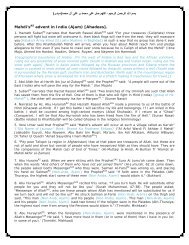Naqliyat-e-Miyan Syed Alam RH (English) - Khalifatullah Mehdi
Naqliyat-e-Miyan Syed Alam RH (English) - Khalifatullah Mehdi
Naqliyat-e-Miyan Syed Alam RH (English) - Khalifatullah Mehdi
Create successful ePaper yourself
Turn your PDF publications into a flip-book with our unique Google optimized e-Paper software.
2<br />
Translator’s Note<br />
In the name of Allah, the Most Beneficent, the Most Merciful.<br />
Here is the <strong>English</strong> Translation of <strong>Naqliyat</strong> <strong>Miyan</strong> <strong>Syed</strong> <strong>Alam</strong> <strong>RH</strong> . <strong>Miyan</strong> <strong>Syed</strong> <strong>Alam</strong> <strong>RH</strong> was the great<br />
grandson of Hazrat Mahdi Mau’ood AS . Therefore apart from the narrations of Hazrat Mahdi AS and his<br />
companions, there are narrations of the next generation too. I have used the Urdu translation by Hazrat<br />
<strong>Syed</strong> Dilawer alias Gorey Mian <strong>RH</strong> as the original.<br />
A translation is always a challenging task not just because of one’s own limitations but also because of<br />
the limitations of the language one is translating to. This problem manifests especially when we are<br />
translating religious literature to <strong>English</strong>. There are many expressions and words in Arabic, Farsi and<br />
Urdu which do not have a direct <strong>English</strong> equivalent. I have explained in the below paragraphs how I<br />
have treated such words and expressions.<br />
Where it is appropriate I have used the Urdu, Persian and Arabic word or words directly and have given<br />
the <strong>English</strong> meanings in brackets e.g. Asr (late afternoon), Maghrib (post sunset). This is because the<br />
word is better understood in its original form and there is no equivalent word in <strong>English</strong>. Where<br />
appropriate I have translated the word into <strong>English</strong> but have given the Urdu word in brackets for clarity.<br />
For e.g. Migrant-Companions (Muhajireen), Mother of Believers (Ummul Momineen).<br />
The Urdu word ‘Hum’ has been translated as ‘We’ although it might refer to a single person. The<br />
context makes it clear whether it is one person or more persons that are referred to.<br />
All the narratives in the original start with the words ‘Naqal hai ke…’ It translates in <strong>English</strong> to ‘It is<br />
narrated…’ I have omitted this phrase in the translation.<br />
The term ‘Allah had sent…’ is a literal translation of ‘Allah ne bheja tha…’ It actually means that<br />
someone had sent these things in the name of Allah.<br />
In many places the word ‘brother’ is used. It does not refer to a sibling (or biological brother). It refers to<br />
a brother in religion, a fellow inmate of a daira or a fellow faqir.<br />
The word ‘banda’ has been translated as ‘this servant’. Very often Hazrat Mahdi AS has used ‘banda’ to<br />
refer to himself. Rarely has he used the word ‘I’. So instead of ‘I say…’, the words used in the narrative<br />
are ‘Banda says…’ which in <strong>English</strong> is translated as ‘This servant says…’. The companions of Hazrat<br />
Mahdi and people of later periods too have also referred to themselves as ‘banda’.<br />
In some places the word ‘banda’ has been used to refer to a third person. I have used the phrase ‘servant<br />
of Allah’ in such instances.<br />
I have used some terms directly without translating them to <strong>English</strong>. There is no equivalent word in<br />
<strong>English</strong>. Therefore the words are explained below:



